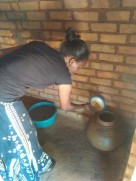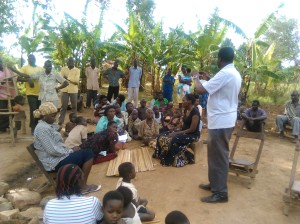Most rural areas in Uganda typically use wood fuel on inefficient three stone fires to purify their drinking, cleaning and washing water. This process results in the release of greenhouse gas emissions from the combustion of wood – this can be avoided if a technology that does not require wood fuel supplies clean water desired by households. Water is our lifeline and a resource we can’t do without as it is essential for all dimensions of life.
Co2balance rehabilitated 10 boreholes to provide clean safe water to the local communities in the rural areas of Kaliro District. With the support of Women Alliance and Children Affairs (WAACHA), a local NGO in Kaliro District in the Eastern part of Uganda and other stakeholders, they have continued to ensure that the project constantly provides clean safe water to the community by doing timely repairs.
The project supports the provision of safe water using borehole technology to hundreds of households within Kaliro district. By providing safe water, the project ensures that households consume less firewood during the process of water purification and as a result there shall be a reduction of carbon dioxide emissions from the combustion process.
Accessing clean safe water is one thing but going an extra mile to ensure that this water is not contaminated is another. Water from many boreholes is contaminated because of lack of knowledge on efficient borehole maintenance by the community. Even when the water source itself is safe, water used for drinking is often contaminated because of poor water-handling practices and unsafe storage, therefore effective and continuous WASH sensitization of the communities is important. Issues like storing their drinking water safely, washing their hands before preparing meals and after using the toilet are often ignored yet it is a very important component. Traditionally, communities in rural areas store their drinking water in clay pots and they see this as the safest way to keep this water from getting contaminated.
Water, Sanitation and Hygiene (WASH) sensitization/training is one of the components of the Co2balance borehole rehabilitation project. We (in collaboration with our partners WAACHA) were able to carry out a WASH training in Kaliro on the 17th and 18th of September 2015 and this was purposely a refresher training for the community on the importance of improved health, reducing the incidence of water and sanitation-related diseases.
During the training, the community was urged to maintain and keep the surrounding area of the borehole clean, dig proper soak pits, avoid stagnant water around the boreholes, install well-designed fencing and ensuring that all surface water sources are protected from human and animal contamination. Also a minimum safety distance of over 30 meters between any latrines and boreholes was emphasized so as not to contaminate the water base.



